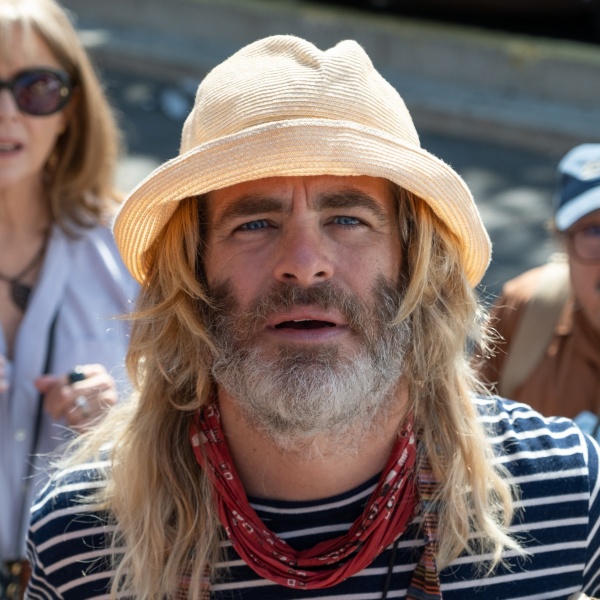
The idea of the insider who, despite pressure from authorities, employers, families and friends, decides to do the right thing and blow the whole operation sky high, has been the source of some pretty terrific drama for getting on half a century now. The latest addition to the canon is “The Whistleblower,” which sees Rachel Weisz as a U.N. operative who risks everything to expose a sex trafficking scandal among her colleagues.
While it involves yet another great performance from the actress, the film ain’t so hot (read our review here), but there are plenty of better options in this endlessly fascinating sub-genre, from Marlon Brando in “On The Waterfront” to Matt Damon in “The Informant!” So what makes these stories of insider dealing and clandestine informing so compelling? Is it the subterfuge, the drama, the tangled web our heroes weave when they, essentially, turn spy against the institution that has until then courted and counted on their loyalty? Is it the inspiration to be gleaned from the moral that one right-thinking person really can make a difference, despite insuperable odds, if they have the strength of character? Or is it, simply, that as scandals break around us every day, and as our faith in old institutions (the banks, the church, the government, the media) is ever more eroded we look to the movies to provide cinematic justice and accountability where too often none exists in real life. These are stories in which individuals make tough choices, listen to their consciences and pick sides, often risking life, limb and the good opinion of the people they love — whether a whistleblower is a hero or a rat depends, after all, on your point of view. We may believe less than ever in the benevolence of corporations, organizations and the power-wielding elite, but as long as there are Davids who take on these Goliaths, whatever the cost and whatever the outcome, there is still hope.
With “The Whistleblower” hitting theaters on Friday (and the topic in the news again, thanks to the endlessly gripping scandal developing at News International), we’ve delved into the history of the genre to pick out some other notable examples. Check them out below.
 “All the President’s Men” (1976)
“All the President’s Men” (1976)
One of the greatest newspaper movies of all time is also one of the best whistleblower movies of all time and easily one of the best movies of its decade; “All the President’s Men” is an enduring, paranoid classic. Based on the bestselling nonfiction book by reporters Carl Bernstein and Bob Woodward (played in the film by Dustin Hoffman and Robert Redford), Alan J. Pakula‘s film is a straightforward drama about the unraveling of a presidency that plays like a crackerjack thriller. Like all the best films based on historical fact, that we know the story (including the ending) doesn’t take away at all from the experience, which thanks to William Goldman‘s no-bullshit screenplay and Pakula’s stylish but never showy direction (that amazing Library of Congress shot!), effortlessly gives off an edge-of-your-seat sensation. The true whistleblower, of course, was Deep Throat (played by Hal Holbrook), who provided our intrepid reporters with the missing puzzle pieces to blow the whole thing wide open. As a historical figure and a literary character he has proven endlessly fascinating, inspiring a scene in “The Simpsons” and a character on “The X-Files” among other things (the real Deep Throat was only outed a few years ago). “All the President’s Men” would go on to be hugely influential on one of the most peerless masterpieces in more recent memory – David Fincher‘s “Zodiac” (which shares ‘Men’s’ composer, newsroom setting, and even a couple of jokes). But unlike “Zodiac,” “All the President’s Men” has a true ending. And oh, what an ending it is. [A]
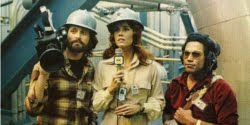 “The China Syndrome” (1979)
“The China Syndrome” (1979)
Released mere weeks before the real-life nuclear accident at Three Mile Island, “The China Syndrome“‘s reception undoubtedly benefited from its topicality and seeming prescience. But the film still holds up years later as an effective, compelling thriller. Admirably stripped of unnecessary embellishments like a romantic subplot or an overly tricksy shooting style, instead it focuses on Jane Fonda‘s TV reporter, ambitious to graduate from fluff pieces to hard news, after she and her cameraman (Michael Douglas) witness a nuclear near-disaster, which is only narrowly averted by company employee Jack Godell (Jack Lemmon). Godell’s subsequent transition from line-toeing company man to suspicious investigator to justifiably paranoid whistleblower, provides the film with much of its emotional power, detailing the toll that such activity can take on one good man, who is inevitably treated as a pariah by colleagues anxious not to rock their bosses’ boat. One of the highlights of James Bridges‘ directorial back catalogue, it is said that his more classical style of filmmaking found him out of favour in the blockbuster era of the 1980s. But this restraint means the film has stood the test of time well: in its low-key tone it is almost the archetype for a whistleblower film, yet it never feels too familiar. It garnered Oscar nominations for Fonda and Lemmon, and also for the script, though ironically, Fonda was beaten out by Sally Field for “Norma Rae,” another whistleblower movie that unfortunately we haven’t had time to include here, in a role Fonda herself had turned down. [B+]
 “The Constant Gardener” (2005)
“The Constant Gardener” (2005)
Fernando Meireilles’s follow-up to “City of God” begins with shots of the Kenyan landscape that are beautiful–hauntingly so, especially when you realize that you’re looking at the aftermath of a murder. “The Constant Gardener” doesn’t waste a second in revealing the death of activist Tessa Quayle (Rachel Weisz in an Oscar-winning performance), the wife of unimportant British diplomat Justin Quayle (Ralph Fiennes), but it does take its time getting to the reasons behind her killing. Though it’s based on a novel from John Le Carré, “The Constant Gardener” is more like poetry, lacking a linear narrative and boasting perfectly composed shots alternately from a shaky handheld camera and a smooth steadicam. The juxtaposition continues with its themes and moods; it’s at once utterly romantic and strikingly realistic, both in its depiction of the marriage of Tessa and Justin and the portrayal of the heartbreaking poverty and corruption in Kenya. Tessa is moved by what she sees, as well as troubled when things don’t add up, and her investigation into the issues she has discovered is mirrored by her husband’s own search for answers following her death. Weisz is captivating as Tessa, but she’s ably supported by an unusually sympathetic Fiennes, as well as fellow greats Danny Huston, Bill Nighy and Pete Postlethwaite. [A-]
 “Dick” (1999)
“Dick” (1999)
Essentially “Romy & Michele Uncover A Vast Government Conspiracy,” “Dick” asks us to consider what might have happened had Watergate whistleblower ‘Deep Throat’ not been former FBI agent W. Mark Felt, but a couple of dunderheaded schoolgirls who inadvertently happened across the break-in whilst staying overnight at the notorious hotel. A long way from “Melancholia” and “Meek’s Cutoff,” Kirsten Dunst and Michelle Williams give game performances as the two ditsy leads, and though he doesn’t physically resemble Tricky Dickie in any way, Dan Hedaya gives one of the best performances of his career imitating the President Nixon’s paranoiac ramblings. The film, though, only hits upon a consistent sweet spot when Will Ferrell and Bruce McCulloch show up as Bob Woodward and Carl Bernstein, bickering like an old married couple, throwing the rest of this unambitious comedy into sharp relief. There are funny moments in and of themselves – Williams’ masturbatory beach fantasy with Nixon is something to behold – but “Dick” dilutes the rest of the crisis down to a series of interminable phallic punchlines and ignores any real attempt at cutting satire. Far too knowing to be dismissed as the backward cousin of “All the President’s Men” – Nixon’s dead dog Checkers is anachronistically wheeled out so the girls can extend their remit as the White House’s “secret youth advisors” – it’s still not smart enough to commit to anything beyond a light ribbing. Given that the rest of director Andrew Fleming’s career has been sketchy at best (the ill-advised remake of “The In Laws;” “Nancy Drew”) we should probably all be thankful he never followed it up with something like “Woody” – a dramedy about the 28th President’s attempts to reconcile the America’s burgeoning post-WWI isolationism with some erection jokes thrown in for good measure. And even though it features a scene of Russian General Secretary Leonid Brezhnev brokering a peace deal whilst tripping on space brownies and singing the opening bars of “Hello, Dolly!,” this “Dick” is still overwhelmingly half-cocked. [C+]
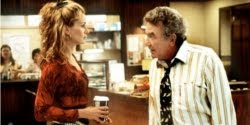 “Erin Brockovich” (2000)
“Erin Brockovich” (2000)
Nobody can accuse Steven Soderbergh of being a one-note director. In 2000, he came out with “Traffic,” a gritty expose on the war on drugs, and “Erin Brockovich,” the true story of a working mother who stumbles on one of the biggest class-action suits ever. The film took Julia Roberts all the way to her first (and most likely last) Oscar win, but it also proved that Soderbergh could turn a pretty profit for the studios. And as a film it has a lot going for it, especially Roberts, who is great as the brassy, argumentative, passionately strong-willed Brockovich, an immensely likable character, who never devolves into self pity over her own difficult circumstances, and whose simple, common-sense morality and quick wit proves more than a match for her adversaries. The character goes through ups and downs, but she’s a fighter, and it would take a hard heart to not be rooting, not just for her clients, but for her personally, by the end. The film also packs one hell of a supporting cast including Albert Finney, Aaron Eckhart (in his first major studio role) and Marg Helgenberger, but it’s Roberts’ film and, like the character she portrays, she dominates it, this time with more than just her thousand-watt smile. Its success was influential too, setting an example for others to come about women taking on corporations, most of which were not as expertly done. [A]
 “Michael Clayton” (2007)
“Michael Clayton” (2007)
Writer/director Tony Gilroy’s first feature, “Michael Clayton,” was one of the best reviewed films of 2007 and for good reason. Gilroy’s script and adept work behind the camera threw a wrench in the whistleblower genre by focusing on authentic characters facing real moral conundrums, each of whom makes questionable choices. George Clooney plays the title character, a “fixer” at a huge law firm who is called in when the shit hits the fan. And hit the fan it does when his colleague Arthur Edens (Tom Wilkinson) discovers that one of their biggest clients, U-North, knew that one of their chemicals was carcinogenic. Facing a crippling class-action lawsuit, U-North’s in-house counsel, Karen Crowder (Tilda Swinton), must decide how to handle Arthur and the information he has threatened to expose. Swinton’s performance (which earned her a long-overdue Oscar) was just one of the many stellar turns that pack the film — Clooney’s work is solid and intelligent, as is that of the late Sydney Pollack as Michael’s boss. However, Wilkinson is quite brilliant as the manic-depressive Arthur who has an almost-complete break with reality, but not with his morals. The film was nominated for seven Oscars (including Best Director, Original Screenplay and Picture), but Swinton’s was the only win. Accolades aside, “Michael Clayton” is a fantastic examination of shady corporate dealings and the courage necessary to take them down. In ‘Clayton,’ Gilroy, who went on to direct the less-impressive “Duplicity,” shows off his talent as a director and his confidence in the intelligence of his audience. [A]
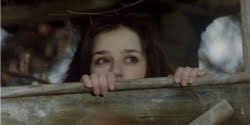 “The Nasty Girl” (1990)
“The Nasty Girl” (1990)
Though its English-language title and cover art might suggest otherwise, this West German film isn’t nasty or naughty at all, a particular feat when considering it’s directed by someone named Verhoeven. But rather than arriving from “Showgirls” helmer Paul Verhoeven, “The Nasty Girl” is directed by the unrelated Michael Verhoeven (“The White Rose”). It follows Sonja (Lena Stolze), first appearing as a high schooler who is writing about her town’s involvement in the Third Reich for an essay. Despite the insistence of those around her that they didn’t aid in the atrocities, Sonja discovers the sins of the the town’s history, causing her to be an outcast among those she’d considered her neighbors. Sonja becomes obsessed with her investigation over the course of a decade, much to the distress of those in the town who wish she’d just stay quiet and stay out of the past. Though it sounds like standard, depressing Holocaust fare, “The Nasty Girl” is surprisingly lighthearted and even fun at times, thanks largely to the postmodern style of Verhoeven, who lets his heroine speak directly to the audience and constantly, almost playfully, breaks the wall between reality and cinema. Unfortunately, (likely as a casualty of the sale of Miramax) “The Nasty Girl” isn’t available on Region 1 DVD, despite receiving an Oscar nomination for Best Foreign Language Film. [B+]
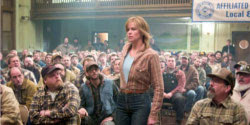 “North Country” (2005)
“North Country” (2005)
Niki Caro’s “North Country” is the type of movie that gets positive attention for all the wrong reasons. It features Charlize Theron with a bad haircut (again “uglying down” for a role like she did in “Monster”, though here she stops short of ‘hideous’ and goes merely for ‘dowdy’), and fictionalizes the first sexual harassment lawsuit won by a female miner who had endured the abuses of the male-dominated mining company. The performances in the film are solid enough with Theron doing a competent job (though not one necessarily worthy of the Oscar nomination she got) and a particularly strong supporting cast of Frances McDormand, Richard Jenkins, Sissy Spacek, Woody Harrelson, Sean Bean and Jeremy Renner, providing excellent back up. It’s a shame then that the film just doesn’t come together and here the sensationalist topic only serves to draw attention to bad filmmaking, which is guilty of a sort of prurience: the court aspect of the film is rushed in favor of showing the female miners suffering abuse over and over. And while we empathize with the difficulties these women faced in reality, in the film, the dialogue is too on the nose, and the metaphoric imagery of drilling into the earth just too overt to do the subject matter justice. [C-]
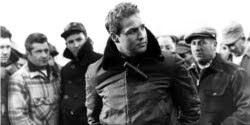 “On The Waterfront” (1954)
“On The Waterfront” (1954)
Long in the offing, Elia Kazan‘s film was based on a 24-part series of articles in the New York Sun by Malcolm Johnson called ‘Crime on the Waterfront’ which told of the corruption, extortion and racketeering in the Manhattan and Brooklyn dockyards. Originally written by Arthur Miller (at Kazan’s request) and called “The Hook“, Kazan and Miller were pressured to change the villains from corrupted union officials to communists — Miller refused and “The Hook” was never made. In the meantime, Kazan confessed to his communist ties and named names to House Committee on Un-American Activities (HUAC) in exchange for his right to continue to work (a fact which makes him a controversial figure to this day). Budd Schulberg (who also wrote “The Harder They Fall,” — see below — and was another ‘friendly witness’) replaced Miller, added the Commies, and won one of the film’s eight Oscars for his trouble. Filmed over 26 days on location in Hoboken, New Jersey, the production encompassed the docks, the worker’s slum houses, local bars and rooftops, and several real-life boxers feature in the cast: all adding to the realism and believability of the finished film. Marlon Brando, in one of his seminal early roles, plays Terry Malloy, whose brother works for the mob-connected union boss Johnny Friendly. Not the brightest spark, Terry does what he’s told, including luring a witness into an ambush that ends in murder. Terry’s conscience starts to get to him and old grudges are aired, leading Terry to utter the film’s most famous line to shame his brother for getting him to throw a fight in his early days as a boxer — “I coulda been a contender.” After his brother ends up dead, Terry is talked out of violent revenge and instead testifies against Friendly and wins back the union and the docks for the workers. Thought to be Kazan and Schulberg’s explanation for being friendly witnesses themselves for HUAC, it was one of the first films that portrayed a heroic informer, but despite the tremendous performances, the repeated emphasis on the waterfront’s moral code of “D and D” (“Deaf and Dumb”) and the cost of remaining silent, are about as subtle as a rock to the head. [B]
 “Prince of the City” (1981)
“Prince of the City” (1981)
Even though it clocks in at 2 hours and 40 minutes, Sidney Lumet’s “Prince of the City” still feels, on a scene-by-scene basis, like an admirably spare and economical work from one of America’s greatest directors. A crime drama with serious intent and one that mostly thrums along with an ominous dead heat, it’s also prone to throwing up pockets of abject physical and emotional violence. To some extent, the film is the mature twin of the director’s earlier “Serpico,” this time with Daniel Ciello (Treat Williams) a bent NYPD officer who reluctantly decides to come clean and grope for moral absolution, exposing his colleagues’ collusion with the New York criminal underworld. In scope alone, it’s an astounding accomplishment. Scripted by Jay Presson Allen from the nonfiction book of the same name written by former Deputy Commissioner of the NYPD Richard Daley, its themes resonate beyond the superficialities of what could otherwise be pat, familiar material, as it becomes clearer Ciello is just one sprocket in an ugly, hypocritical machine, and he and his partner’s sanity begins to fray around the edges. Things perhaps wander off course in the back half, and Williams’ performance falters with it, rendering the eventual conclusion a little flat, framed as it is around a rather staid courtroom drama that lacks the tenacity of Lumet’s next film “The Verdict.” More to the point, with a cast of seemingly hundreds of minor characters, anyone not keeping up with the film’s forensic and slavish attention to detail will quickly get lost in its dense moralistic and narrative chicanery. Though an exposé of this breadth and complexity has since found its natural latter-day home in David Simon’s work with HBO, both on “The Wire” and providing the novelistic source for “Homicide: Life on the Street,” it’s still slightly depressing that cinema has not dared to venture into these waters since, especially as it remains one of Lumet’s most difficult and essential works. A directorial giant we lost earlier in the year, his legacy seems more vital now than ever. [A-]
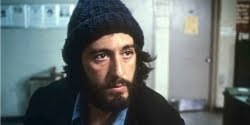 “Serpico” (1973)
“Serpico” (1973)
Frank Serpico, whose story was the basis for the movie “Serpico” directed by the late Sidney Lumet, was the first New York City police officer to report on the widespread corruption in the NYPD. Amid shots of New York, from the towering Brooklyn Bridge to the dirty, grimy dirty streets that pay homage to the film noirs of the past, the story unfolds as Serpico goes undercover to expose the corruption of his fellow officers, learning first-hand the consequences of whistleblowing. First harassed, then threatened, and eventually shot in the face, he was real-life proof that one man’s crusading informer is another man’s traitor. The Serpico of the film is an idealistic straight-laced cop and an unconventional guy who is constantly exposed to corruption and illicit dealings within the force by a bunch of bad guys with badges. They want him to be one of them, but instead he retreats into himself, at first hopeful of simply keeping himself clean of the mess by being a good cop and refusing any involvement with the ringleaders. But the stress of constantly trying to identify the shades of grey between good and evil takes its toll on him, and he eventually appears to testify before the NAPA Commission about payoffs and corruption. The film sticks to the facts of Serpico’s life, with the ex-cop even supervising on set, before being sent away by Lumet, who was concerned he was making the actors self-conscious. It didn’t seem to adversely affect Pacino’s performance, however: it is one of his very best, winning him a Golden Globe, and an Oscar nomination, and now serves as a summary reminder of the amazing talents currently being put to use in Adam–Sandler-In-Drag movies. [A]
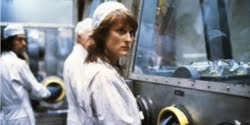 “Silkwood” (1983)
“Silkwood” (1983)
As explained in the outstanding joint commentary from filmmakers Mike Nichols and Steven Soderbergh on Nichols’ “Catch-22,” politically charged melodrama “Silkwood” was the first movie in which Nichols experimented with a whole bunch of cuts, breaking away from the long, fluid camerawork and minimal cutting that had defined his work until then (including “Catch-22”). What this editorial style adds to “Silkwood” is a sense of urgency – of the walls closing in around Karen Silkwood as she labors (both with the government and then later independently) to expose the potentially harmful wrongdoing in the plutonium plant where she works. As a whistleblower movie, it’s aces – Streep is outstandingly ego-less in the lead performance (it earned her an Oscar nomination) — and it really fires up when it delicately balances the more maudlin, emotional familial elements (Kurt Russell is terrific as Streep’s strained husband) with the hard-hitting issues of the time (in 1983 nuclear power was about as hot-button as it got). It should be noted, though, that despite its timeliness, it doesn’t feel particularly dated today (although can you believe they gave away the ending on the original theatrical poster? What were they thinking?). The script, based on a true story and co-written by Nora Ephron, is its most effective when it emphasizes that the personal truly is political and that some things really are worth fighting (and potentially dying) for. Also: it’s probably the only movie on our list to inspire a popular phrase: the “Silkwood Shower,” named after the decontamination procedure in the movie, is often referred to when someone has a less-than-clean hook-up and needs to rinse themselves clean of the dirtiness (both literal and spiritual). We’ve all been there… [B+]
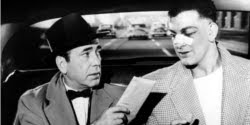 “The Harder They Fall” (1956)
“The Harder They Fall” (1956)
The movie adaption of the novel of the same name by Budd Schulberg, “The Harder they Fall” is a riff on the career of Primo Carnera, who, though freakishly large, apparently wasn’t that great a boxer, with rumors circulating that his career was forged out of fixed fights. “The Harder They Fall” is probably more known for being Humphrey Bogart’s last film before his death in 1957 than anything else, and yes, the role is pure Bogart: that of a cynical loner following his own set of rules of what’s right and wrong. Instead of his go-tp character of PI, in this film noir he plays sports reporter Eddie Willis, a character based on the boxing writer and event promoter Harold Conrad. Forced between a rock and a hard place financially after the newspaper he was writing for goes under, he’s forced to publicize a new giant Argentinian boxer Toro Moreno, for crooked promoter Nick Benko. After developing a bond with the slow-witted and untalented boxer, he sends him home with Benko’s dough, won betting against Toro in a fight in which he was brutally knocked out. In the end Willis confronts Benko and starts writing to expose him and widespread corruption of the boxing world. “The Harder They Fall” is an under-apppreciated behind-the-scenes boxing drama, and its worth extends beyond that of its leading man. [B+]
 “The Insider” (1999)
“The Insider” (1999)
“Heat” may have gotten the most attention, pairing as it did Robert De Niro and Al Pacino for the first time (and it’s undoubtedly a great film), but ask us what our favorite Michael Mann film is, and we’d have to lean towards his gripping based-in-fact “The Insider.” Going behind the scenes of the tobacco lawsuits of the 1990s, it focuses on the relationship between CBS producer Lowell Bergman (Pacino) and former tobacco executive Jeffrey Wigand (Russell Crowe), who agrees to turn whistleblower after being fired, but is blocked at every turn by his former employers. Thanks to a script by Mann and Eric Roth which makes the legal complexities totally clear, while remaining gripping, the human cost of what Wigand is doing never escapes us. Mann’s in top form as well, giving what could be a talky drama a visual zip, with some of Dante Spinotti‘s finest work ever, and the score by Pieter Bourke and Lisa Gerrard, is haunting. But it’s the performances that really make it sing: it’s one of Pacino’s more restrained performances of recent years, with Shouty Al only rarely raising his head, and Christopher Plummer is terrific as anchor Mike Wallace. But the MVP is Russell Crowe. Playing 20 years older than his then age (in a part initially earmarked for Val Kilmer, allegedly), he’s almost unrecognizable from the lithe killing machine he’d be seen as six months later in “Gladiator,” here he really sells Wigand as a fundamentally good person with a dark streak, and it’s impossible not to feel sympathy for him as his life falls apart around him. [A]
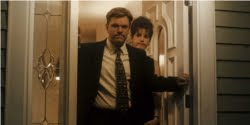 “The Informant!” (2009)
“The Informant!” (2009)
Having already succeeded with a fairly straightforward character-based whistleblower picture in “Erin Brockovich” and wisely realizing “The Insider” is still an untouchable milestone in this genre, Steven Soderbergh realized the only logical entry point for the story of agricultural price-fixing tattle-tale Mark Whitacre was through comedy. Indebted to the ’70s in more ways than one — the hilariously goofy Marvin Hamlisch score, the groovy font title cards throughout and the non-traditional narrative filled with minor character crises –“The Informant!” is an amusing homage to that era. Featuring a portly Matt Damon in the lead as a cheerful, bi-polar, Midwestern bio-chemist, the picture doesn’t follow a three act structure as much as it just layers whopping fib on top of gigantic lie wrapped up in ridiculous fabrication; soon enough it’s impossible to tell what’s fact or fiction. Aside from the score and wickedly sly off-topic voice-over, Soderbergh plays it all deliciously straight and matter-of-fact, and Damon seems to relish playing the apogee of unreliable narrators who actually thinks he’s some sort of spy. The whole thing is rounded out by a strong supporting cast that conveys various levels of disbelief and ridicule — Melanie Lynskey in particular does a subtly strong job as Mark’s supportive wife. Unorthodox enough to be generally out of step with modern-day audiences (it didn’t exactly clean up at the box-office), nevertheless, “The Informant!” is a devilishly funny little riff and another picture in a long line of Soderbergh-ian experiments in a sub-genre. [B]
 “The Whistle Blower” (1987)
“The Whistle Blower” (1987)
Drab and stodgy in parts and feeling rather dated due to its stifling preoccupation with the British class system, “The Whistle Blower” does have one huge thing going for it: Michael Caine‘s performance. Perhaps because he has been around so long, been in a fair few absolute stinkers and is so eminently impersonate-able (who among us is not guilty of having hazarded the odd “you were only supposed to blow the bloody doors off”), it’s somehow easy to forget that under the mannerisms, the accent, the ‘national treasure’ status, there is a truly fine actor. That his performance elevates an otherwise rather turgid expose of the British Secret Service’s double dealings and class snobbery into something watchable and at times even compelling is no faint praise: he brings real subtlety, restraint and dignity to his portrayal of Frank Jones, an ex-serviceman exposing the corruption and amoral politicking that led to the murder of his son. If approached as a human drama, therefore, the film works much better than as a thriller- it is as much about Jones’s disillusionment with his government and his growing, if belated, understanding of his son’s politics as it is about car chases or spy games. A host of British character actors lend able support, if mostly in rather one-note roles: James Fox, Gordon Jackson and John Gielgud are never less than good value, but this is Caine’s show and he steals it. His small but devastating portrayal of a man grieving the loss of a son, and of a faith that he had previously fought and killed for, has to rank as one of the actor’s finest moments to date. Shame the rest of the film falls short. [B-]

